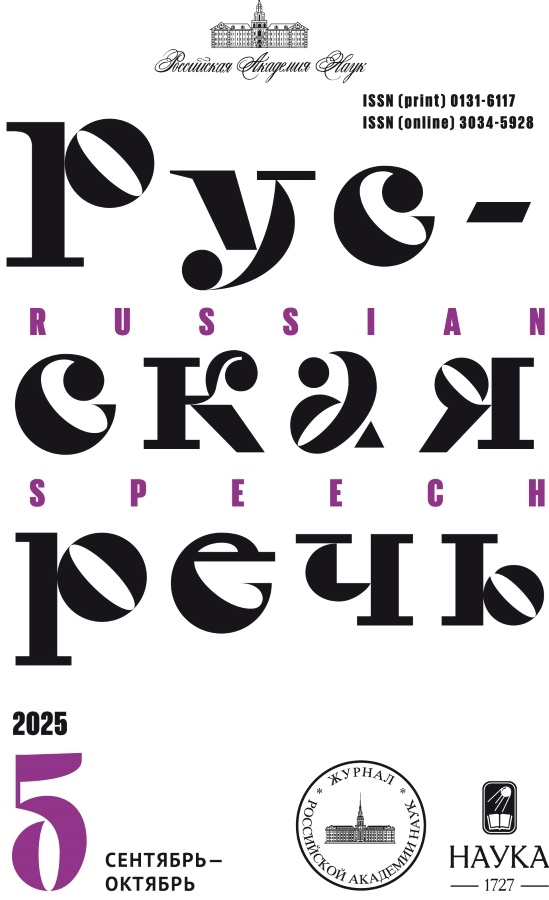Representation of the "Great Academic Dictionary of the Russian Language" in a Lexicographic Information System
- 作者: Vaulina E.Y.1
-
隶属关系:
- Institute for Linguistic Studies of the Russian Academy of Sciences
- 期: 编号 5 (2025)
- 页面: 7-21
- 栏目: Issues of Modern Russian Language
- URL: https://transsyst.ru/0131-6117/article/view/692799
- DOI: https://doi.org/10.31857/S0131611725050013
- ID: 692799
详细
The article considers the development of an electronic version of the "Great Academic Dictionary of the Russian Language", the last volumes of which are still being compiled by the Institute for Linguistic Studies, from a lexicographical perspective. It analyzes the possibilities of creating an electronic version, taking into account its structural features, its place within the lexicography of the Russian language, and using its materials in the current and future lexicographic projects. The electronic representation of the dictionary will make it possible to visualise the connections between language units using hyperlinks, which can be perceived as a return to the tradition of compiling definitions in academic lexicography. However, it is impossible without analysing the systematicity and possibility of structuring the elements of a dictionary entry, unifying the homogeneous language phenomena. We should consider the "Great Academic Dictionary of the Russian Language" as one of the most significant multi-volume publications in Russian lexicography and a unique collection of quotation material and aim to present the appearance of its entries traditionally. The use of hidden internal markup in dictionary articles is particularly important from this point of view. Hidden markup is taken into account when forming hyperlinks, processing search queries, etc. but does not affect the visual perception of the article on the screen. It is also supposed to use the modes of data presentation in collapsed (definition without illustrative material) and full form. Creating an electronic dictionary presentation while making changes and additions to its text will allow lexicographers to use all benefits of collaboration and get the basis for new lexicographic projects.
作者简介
E. Vaulina
Institute for Linguistic Studies of the Russian Academy of Sciences
Email: miauling@yandex.ru
St. Petersburg
参考
- Бельчиков Ю. А., Солганик Г. Я. О лексикографических изданиях адресной направленности // Облик слова: сб. ст. памяти Д. Н. Шмелева. М.: Институт русского языка, 1997. С. 41–47.
- Ваулина Е. Ю. Принципы иллюстрирования и функции иллюстративного материала в «Современном толковом словаре живого русского языка» // Языковая личность: аспекты изучения: сб. ст. памяти Ю. Н. Караулова. М.: МАКС Пресс, 2017. С. 47–65.
- Воронцов Р. И. Еще раз о нормативности и историзме академического толкового словаря большого типа // История, теория и практика академической лексикографии. СПб.: ИЛИ РАН, 2022. С. 95–120.
- Герд А. С., Горбачевич К. С. (ред.). Большой академический словарь русского языка. Т. 1–. М.; СПб.: Наука, 2004–.
- Герд А. С. Академический словарь в свете современных социолингвистических тенденций // Acta Linguistica Petropolitana. Труды института лингвистических исследований. 2013. Т. IX, ч. 2. С. 131–137.
- Горбачевич К. С., Герд А. С. Предисловие // Большой академический словарь русского языка. Том 1 А — Бишь. СПб.: Наука, 2004. С. 3–6.
- Заграевская Т. Б. Теория словаря в отечественных оригинальных концепциях конца ХХ — начала XXI веков // Вестник Ленинградского государственного университета им. А. С. Пушкина. Серия Филология. 2012. № 3. Т. 1. С. 90–98.
- Караулов Ю. Н. Об одной тенденции в современной лексикографической практике // Русский язык. Проблемы художественной речи. Лексикология и лексикография. Виноградовские чтения IX–X. М.: Наука, 1981. С. 135–153.
- Молотков А. И. Фразеологический словарь русского языка. М.: Русский язык, 1987. 543 с.
- Морковкин В. В. Учебная лексикография как особая лингвометодическая дисциплина // Актуальные проблемы учебной лексикографии. М.: Русский язык, 1977. С. 28–37.
- Национальный корпус русского языка [Электронный ресурс]. URL: https://ruscorpora.ru (дата обращения: 09.12.2024).
- Скляревская Г. Н. Новый академический словарь русского языка. Проспект. СПб.: ИЛИ РАН, 1994. 64 с.
- Сороколетов Ф. П. О словаре современного русского литературного языка // Советская лексикография. М.: Русский язык, 1988. С. 33–45.
- Стройков С. А. Электронный лексикографический гипертекст как объект компьютерной лингвистики и современной лексикографии // Высшее гуманитарное образование XXI века: проблемы и перспективы. Самара: Самарский государственный социально-педагогический университет. 2009. Т. 2. С. 364–366.
- Ушаков Д. Н. (ред.). Толковый словарь русского языка: в 4-х т. Т. 1. М.: Гос. институт «Советская энциклопедия», 1935. 821 с.
- Фесенко О. П., Лаухина С. С. Электронные словари как продукт современной лексикографии // Омский научный вестник. 2015. № 4. С. 46–48.
- Филин Ф. П., Сороколетов Ф. П., Горбачевич К. С. О новом издании «Словаря современного русского литературного языка» (в семнадцати томах) // Вопросы языкознания. 1976. № 3. С. 3–19.
- Филиппович Ю. Н., Чернышева М. И. Историческая компьютерная лексикография — terra incognita в компьютерном мире // Компьютерра. 1999. № 45. С. 45–50.
- Чердаков Д. Н. Словари русского языка в Интернете // Journal of applied linguistics and lexicography. 2020. № 2. С. 193–209.
- Чернышев В. И. (ред.). Словарь современного русского литературного языка: в 17 т. М.; Л.: Издательство Академии наук СССР, 1948–1965.
- Kustova G. I., Paducheva E. V. Semantic Dictionary as a Lexical Database // EURALEX-1994, Proceedings. Amsterdam, 1994. P. 479–485.
- Lenders W. Supplementary Volume Dictionaries. An International Encyclopedia of Lexicography. Berlin: De Gruyter Mouton, 2014. 982 p.
- Varantola K. Use and Usability of Dictionaries: Common Sense and Context Sensibility? // Lexicography and Natural Language Processing: A Festschrift in Honour of B. T. S. Atkins. EURALEX-2002, Proceedings. Grenoble, 2002. P. 30–44.









